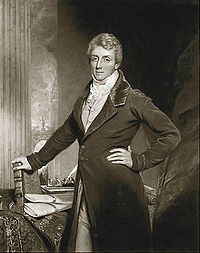- Charles Grant, 1st Baron Glenelg
-
The Right Honourable
The Lord Glenelg
PC FRS
President of the Board of Trade In office
4 September 1827 – 11 June 1828Monarch George IV Prime Minister The Viscount Goderich
The Duke of WellingtonPreceded by William Huskisson Succeeded by William Vesey-FitzGeraldn Secretary of State for War and the Colonies In office
18 April 1835 – 20 February 1839Monarch William IV
VictoriaPrime Minister The Viscount Melbourne Preceded by The Earl of Aberdeen Succeeded by The Marquess of Normanby Personal details Born 26 October 1778 Died 23 April 1866 Nationality British Political party Tory
WhigAlma mater Magdalene College, Cambridge Charles Grant, 1st Baron Glenelg PC FRS (26 October 1778 – 23 April 1866) was a Scottish politician and colonial administrator.
Contents
Background and education
Grant was born in Kidderpore, Bengal, India, the eldest son of Charles Grant, chairman of the directors of the British East India Company. His brother, Sir Robert Grant, was also an MP as well as Governor of Bombay. He was educated at Magdalene College, Cambridge, and became a fellow in 1802.[1] He was called to the bar in 1807.
Political career
In 1811 Grant was elected to the British House of Commons as Member of Parliament for Inverness Burghs. He held that seat until 1818, when was returned for Inverness-shire. He was a Lord of the Treasury from December 1813 until August 1819, when he became Chief Secretary for Ireland and a Privy Counsellor. In 1823 he was appointed Vice-President of the Board of Trade; from September 1827 to June 1828 he was President of the Board of Trade and Treasurer of the Navy.
Grant broke with the Tories over Reform and joined the Whigs (via the Canningite Tory splinter group). He was President of the Board of Control under Lord Grey and Lord Melbourne from November 1830 to November 1834. At the Board of Control Grant was primarily responsible for the Act of 1833 that altered the constitution of the Government of India. In April 1835 he became Secretary of State for War and the Colonies, and was created Baron Glenelg, of Glenelg in the County of Inverness.[2] His term of office was a stormy one. His differences with Sir Benjamin d'Urban, Governor of Cape Colony, were serious; but more so were those with King William IV and others over the administration of Canada. Lord Glenelg was still Secretary when the Canadian rebellion broke out in 1837; his policy was fiercely attacked in Parliament; he became involved in disputes with Lord Durham, and the movement for his supersession found supporters even among his colleagues in the cabinet. In February 1839 Lord Glenelg resigned. He has been called the last of the Canningites.
Personal life
Lord Glenelg died in Cannes, France on April 1866, aged 87. The barony became extinct on his death.
Notes
- ^ Grant, Charles (post Lord Glenelg) in Venn, J. & J. A., Alumni Cantabrigienses, Cambridge University Press, 10 vols, 1922–1958.
- ^ London Gazette: no. 19267. p. 877. 5 May 1835.
 This article incorporates text from a publication now in the public domain: Chisholm, Hugh, ed (1911). Encyclopædia Britannica (11th ed.). Cambridge University Press.
This article incorporates text from a publication now in the public domain: Chisholm, Hugh, ed (1911). Encyclopædia Britannica (11th ed.). Cambridge University Press.
External links
- Hansard 1803–2005: contributions in Parliament by Charles Grant
Parliament of the United Kingdom Preceded by
Peter BaillieMember of Parliament for Inverness Burghs
1811–1818Succeeded by
George CummingPreceded by
Charles GrantMember of Parliament for Inverness-shire
1818–1835Succeeded by
Alexander William ChisholmPolitical offices Preceded by
Robert PeelChief Secretary for Ireland
1818–1821Succeeded by
Henry GoulburnPreceded by
Thomas WallaceVice-President of the Board of Trade
1823–1828Succeeded by
Thomas Frankland LewisPreceded by
William HuskissonPresident of the Board of Trade
1827–1828Succeeded by
William Vesey-FitzGeraldTreasurer of the Navy
1827–1828Preceded by
The Lord EllenboroughPresident of the Board of Control
1830–1834Succeeded by
The Lord EllenboroughPreceded by
The Earl of AberdeenSecretary of State for War and the Colonies
1835–1839Succeeded by
The Marquess of NormanbyPeerage of the United Kingdom New creation Baron Glenelg
1835–1866Extinct  This article incorporates text from a publication now in the public domain: Chisholm, Hugh, ed (1911). Encyclopædia Britannica (11th ed.). Cambridge University Press.Categories:
This article incorporates text from a publication now in the public domain: Chisholm, Hugh, ed (1911). Encyclopædia Britannica (11th ed.). Cambridge University Press.Categories:- 1778 births
- 1866 deaths
- People of British India
- British Secretaries of State
- Whig (British political party) MPs
- Conservative Party (UK) MPs
- Fellows of Magdalene College, Cambridge
- Scottish politicians
- Members of the United Kingdom Parliament for Scottish constituencies
- Alumni of Magdalene College, Cambridge
- Barons in the Peerage of the United Kingdom
- Fellows of the Royal Society
- Members of the Privy Council of the United Kingdom
- Members of the Privy Council of Ireland
- UK MPs 1807–1812
- UK MPs 1812–1818
- UK MPs 1818–1820
- UK MPs 1820–1826
- UK MPs 1826–1830
- UK MPs 1830–1831
- UK MPs 1831–1832
- UK MPs 1832–1835
Wikimedia Foundation. 2010.
